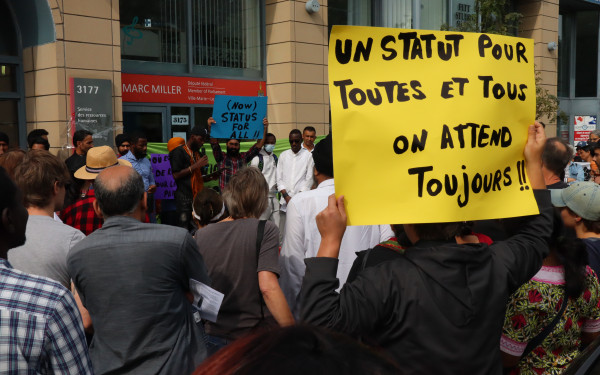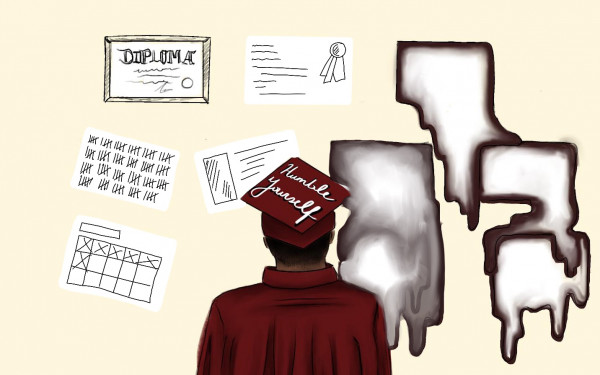Mexican Mother Facing Deportation without Infant Son
Alleges Abuse at the Hands of Husband
UPDATE: Ivonne Hernandez’s deportation date has been pushed back
Ivonne Hernandez fled four different states in Mexico, but she says her alleged abuser always caught up with her.
Seeking asylum from domestic violence, her escape led her to Montreal in 2009, where she eventually got married and had a child, but again ended up facing abuse.
Now after having lived in Canada without status for about a year-and-a-half, Hernandez, 41, is facing deportation on Feb. 7 without her 13-month-old son.
Her situation is not uncommon among many Mexican women now seeking asylum in Canada, and is raising questions about the country’s treatment of refugee claimants, according to organizations speaking out on her case and fighting for her to stay in Canada.
“We’ve seen a few cases of women asking for refugee status in Canada, and who have been victims of violence [while] in the country,” president of the Fédération des femmes du Québec, Alexa Conradi, told The Link after a press conference held by the FFQ on Monday.
“The Canadian response has been, ‘If you just [leave the country] you’ll be fine, we recognize that you are a victim, but you need to go back and just move somewhere else.’”
_900_520_90.jpg)
Those organizations—Doctors Without Borders, the FFQ, Québec solidaire and Solidarity Across Borders—are advocating for Hernandez to “at least gain custody of her child, whether that be in Mexico or in Canada, that’s priority number one,” said her lawyer, Stewart Istvanffy.
But the March 6 hearing date to regain care of her child, who she only gets to see eight hours a week, is set a month after she has to leave the country.
Hernandez was denied custody due to her lack of status in a rushed hearing at the Superior Court in St-Jérôme on Jan. 10, initiated by the father after she left him with her son for a women’s shelter. Hernandez says the judge ignored her domestic violence claims.
“Without considering her parental capacity and without investigating the parental capacity of the father either,” said Sonia Dionne, director of the Maison d’hébergement Le Parados where Hernandez is living, at the press conference.
“The child is well developed. She took care of him alone and he is safe with her—we saw that, but who asked us this before taking her child away? No one,” she added.
On Jan. 22, Hernandez was arrested by border police at Berri-UQAM metro station, where she was to pick up her child from his father.
She had been living at the women’s shelter with her son since December, after leaving her husband, who she alleges has abused her physically and psychologically.
Hernandez was released on Jan. 24 on a $4,000 cash bond and is required to report to immigration authorities regularly.
“I am guilty because I want to be free of that situation? I don’t think so because all women, we need to be protected, we need to live in an environment clean from violence,” said Hernandez at the press conference, tears welling up in her eyes.
In October 2011, she was denied refugee status on the basis that Mexico is considered to be a “safe country.” Last February, then-Minister of Citizenship, Immigration and Multiculturalism Jason Kenney added Mexico to a list of countries considered “safe,” making it harder for refugee claimants like Hernandez to get asylum in Canada.
“This is an extremely hypocritical way of refusing people who really are in danger. There’s really no protection in Mexico,” said Istvanffy, citing a judgment made by the Inter-American Court of Human Rights that claimed there was next to no protection for Mexican women facing gender-based violence.
Four months pregnant and despite facing the risk of being deported at any moment, she decided to stay because “she was happy, she was married,” said Istvanffy.
Things went downhill from there. Her husband regularly threatened to denounce her to authorities, Hernandez said. Her decision to leave him was not easy though.
“I investigated months before because I knew it was dangerous for my baby, I tried to get the best advice that I could before I left,” said Hernandez.
“In these types of situations, often there’s abuse in the relationship between the person who is sponsoring and the person who is being sponsored. And often, they play around with this question of the papers,” said Istvanffy.
All speakers present at the press conference stressed the need for better protection for people in “these types of relationships.”
“The message being given, today, is if you leave the guy, you can lose everything,” added Istvanffy.
Due to privacy laws and because “removals are a [Canadian Border Services Agency] matter,” Citizenship and Immigration Canada were unable to give comment on the case.
In an email statement to The Link, CBSA communications advisor Jacqueline Roby said, “It is necessary to proceed with the removal of failed asylum seekers and people who do not meet the immigration rules to ensure the integrity of Canada’s immigration program” and that refugee claimants may appeal for “pre-removal risk assessment” before their deportation date.
Hernandez is set to appear before Federal Court on Tuesday for her last chance at staying in Canada.
“We always will be family and I just want the opportunity to stay close to my baby,” said Hernandez. “Because if I leave, maybe I will not see him again.”

_900_713_90.jpg)


_600_375_90_s_c1.jpg)
_600_375_90_s_c1.jpg)

